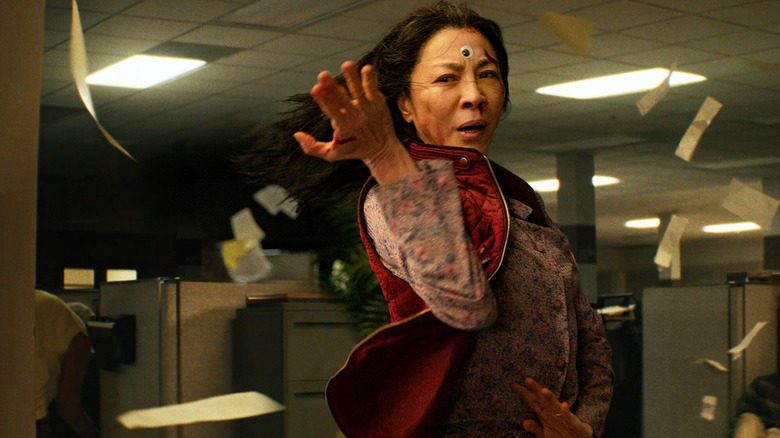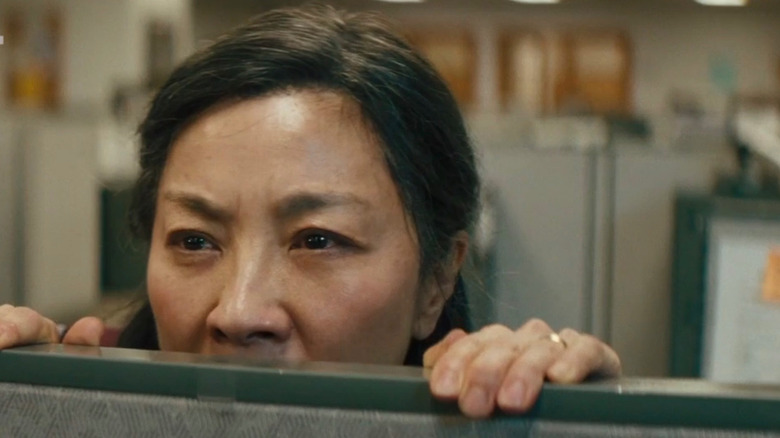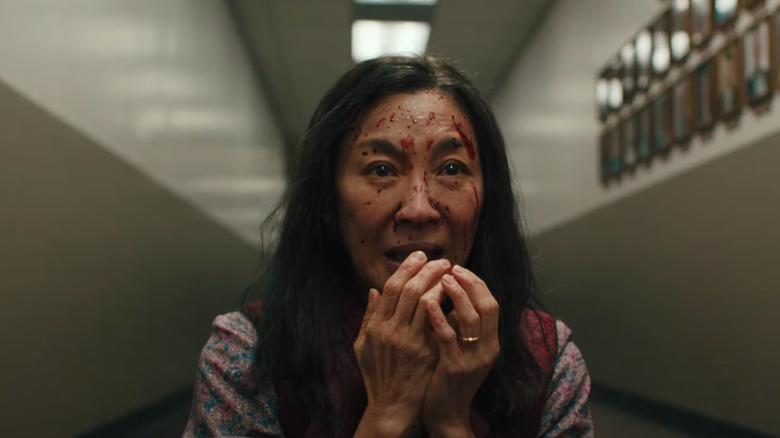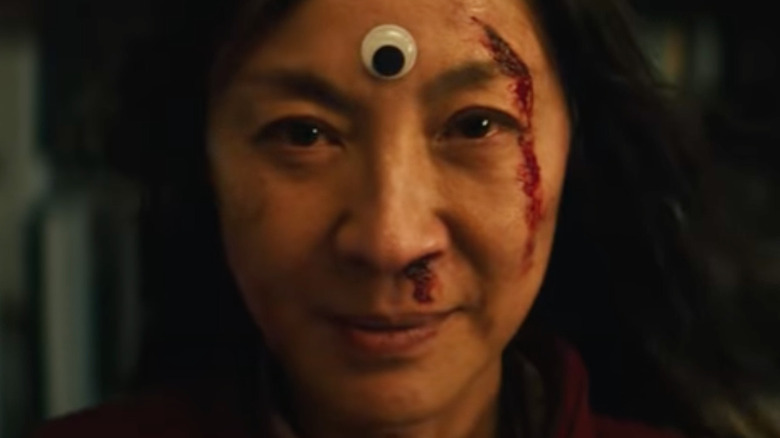Everything Everywhere All At Once Review: Chaos And Kindness Collide In A Mind-Melting Masterpiece [SXSW]
The world is on fire. Literally. Metaphorically. And there's no escaping it. We're bombarded with images of war, of environmental collapse, and societal upheaval. The pressures of being alive in 2022 are borderline debilitating — how are we expected to function in a landscape where every day brings a fresh apocalypse? We're surrounded on all sides, and it's enough to make us numb, to desensitize us to the pain of modern existence. The reminders are everywhere. They are everything. And they are coming at us all at once.
"Everything Everywhere All at Once" is a deceptively thoughtful movie, one that mixes the lowest of low humor with startling wit, raw and stylish action with heady science fiction ideas, surreal running gags about the Pixar movie "Ratatouille" with a harrowing examination of embracing oblivion because there's seemingly nothing else left. It still feels brisk at 132 minutes, and there's a lot of movie in this movie — a spiraling, sweeping, stunning descent into madness followed by a stirring call for healing, and for kindness.
It's impossible to describe. It's unlike anything you've ever seen. It's the best American movie in years, and certainly the best movie to hit theaters since the pandemic began.
Written and directed by Daniel Kwan and Daniel Scheinert (credited here, as they were on their first feature, "Swiss Army Man," as Daniels), "Everything Everywhere All at Once" doesn't wear obvious influences on its sleeve, but it does recall the work of a mind-boggling blend of other artists. By setting its ambitious sci-fi premise almost entirely within a bland government office building, the Daniels recall the work of the late, great Douglas Adams, who used science fiction to stare into the vast cosmos, and our vapid attempts to make sense of it via bureaucracy, and laugh. By quickly abandoning any semblance of physical reality in favor of a landscape where anything can happen and anything is allowed as long as it's funny, the film recalls the anarchic work of animators like Chuck Jones and Tex Avery. And by blending hard-hitting science fiction action with philosophical musings about the nature of existence, "Everything Everywhere All at Once" can't help but feel like "The Matrix" for the post-Trump era.
That the film captures the essence of all of those artists while also being its own unique, unruly beast is a testament to the Daniels' ingenuity as storytellers. They reflect the specific corners of the pantheon without relying on it.
Everything
"Everything Everywhere All at Once" operates at a sprint. In the spirited, specific, and extremely charming opening scenes, we meet the Wangs, Chinese-Americans who operate a struggling laundromat and live in a cramped apartment on the second floor. Evelyn (Michelle Yeoh) is despondent, bored, and prone to distraction, her life an endless cycle of disappointment. Her husband, Waymond (Ke Huy Quan), is bubbly and well-meaning, a glass-half-full kind of guy who wears a fanny pack and a smile and really does seem to be trying too damn hard, huh? Their daughter, Joy (Stephanie Hsu), would really like her mother to acknowledge her girlfriend, but that rift is just the tip of an under-discussed iceberg. Evelyn's father, Gong Gong (James Hong, having a meal with a small role), is also around, an ailing patriarch whose unsaid disapproval lingers over the family like a cloud.
Everyone's in a bad place before they have to deal with an audit from a casually cruel IRS inspector (Jamie Lee Curtis). And everyone feels defeated before Waymond's body is taken over by his counterpart from another dimension, a universe where technology allows individuals to tap into the memories, skills, and emotions of their infinite selves across infinite universes created by branching choices we make in any given moment. Alpha-Waymond, as he is called, comes with a warning. A destructive force has been waging war on the multiverse, and his universe, which looks like something out of a post-apocalyptic '80s movie, is the last line of defense. They need Evelyn, a woman in a stale marriage with seemingly no skills who can't even get her taxes done, to save all of existence.
Of course, an informed moviegoer sees the joke immediately. Michelle Yeoh is one of the greatest action stars of all time, a commanding physical presence whose skills as a martial artist have been on display across countless movies over several decades. "Everything Everywhere All at Once" wisely leans into the humor of this, letting Yeoh flex her comedy chops. Watching her struggle against invaders from across the multiverse is amusing, and made all the more satisfying when the story reaches the fireworks factory. Using tech from Alpha-Waymond's universe, Evelyn borrows the skills from her alternate selves across dimensions, leading to many scenes of Yeoh kicking every single ass she possibly can. The action is staged with clarity and imagination, the Daniels' camera as active as Yeoh, who has never been better. And when Evelyn borrowing from a martial artist version of herself starts to wear itself out, the Daniels find other ways to freshen the action. Evelyn steals the skills of versions of herself who are singers, chefs, and even sign twirlers, picking and choosing abilities from across the multiverse to solve any bizarre situation.
And bizarre is the key word there. The Daniels are no stranger to crude, ribald humor and the high-concept science fiction on display here doesn't mean they're above gross-out gags and low comedy. You see, the key to tapping into other universes involves seemingly random and outrageous acts that defy logic and build links between alternate selves. This gives the film permission to throw logic out the window and engage in glorious weirdness, aiming low and hitting so high. Yeoh's comic timing is impeccable, but her co-stars match her fearlessness. Just when you think the movie has pulled off its most gleefully immature stunt, it finds a new way to bottom out and top itself. Curtis, living legend that she is, proves especially game in this department.
Everywhere
If this sounds like a lot of movie ... Well, it is. So much movie. A great deal of movie. And that's before you even address the heart beneath the action, the emotion beneath the heady genre trappings. Evelyn's war for the multiverse may take place mostly in a single office building, but it spans countless worlds. The sensory overload of it all threatens to break her, to create cracks in the clay pot that is her mind, as the movie describes it. And she is up against a force that is profoundly broken: a figure from another universe who gained access to all of existence, to their every form and variant, and snapped. They stared into oblivion, saw everything, and realized that it all meant nothing. What use is this whole existence thing, anyway?
This nihilism strikes a nerve at this point in the 21st century, where we're able to bear witness to an entire world's worth of tragedy and pain from our phones, and all we can do is sit by, say "Well, that sucks," and try to move on with our day because what else can we do? "Everything Everywhere All at Once" recognizes that unhealthy sensory overload and imagines it happening on an infinite scale, via a mind exposed to every single piece of information across every single universe and being unable to take it.
That it also leads to a hilarious visual sight gag is typical of the film's blend of humor and insight. The reveal of the villain's grand secret weapon is simultaneously hilarious and chilling.
There's a real millennial energy to the adversary of the film, a sense of bitterness and anger, that there is no way out, so why even bother? And like so much millennial art, "Everything Everywhere All at Once" assumes you've seen enough movies to keep up with it. Like the Wachowski sisters' "Speed Racer" or Edgar Wright's "Scott Pilgrim vs the World," the Daniels stack visual tricks on top of each other, wrap dense exposition into action, and trust you to keep up with a pace that feels like it can't stop, won't stop, and doesn't apologize. It would be exhausting if the film didn't feel like it's refreshing itself every 15 minutes, finding brand new ways to assault your senses.
When the film does slow down late in its third act, it does so via an ambitious comedy set piece that doubles as emotional catharsis, all without dialogue, and all staged in a way that should be seen to be believed. We'll be talking about the scene with the rocks for quite some time, I think.
All At Once
It's in those slow moments that the film finds its soul amidst the glorious chaos and sci-fi mayhem. Evelyn's dissatisfaction with her own life, as well as her growing interest in the cool, calm, and confident Alpha-Raymond over her own spouse, hits hard, and Yeoh captures the simmering anger of someone who, deep in middle-age, is taking stock of their life and realizing they're as unhappy as they could possibly be. Her exposure to an infinite pool of alternate Evelyns, versions of herself who are wealthier, healthier, stronger, and seemingly happier, drives the point home. At some point, in the infinite web of branching paths that make the universe tick, she f***** up. And she has to live with that.
Yeoh is balanced by Ke Huy Quan (the film's heart and secret weapon, whose work in the final stretch of the film is downright staggering) and Stephanie Hsu, whose Joy endures a journey best left discovered on the screen. These three leads, tasked with playing not just one character but other versions of these characters across the multiverse, reflect the film's ethos, and its exploration of how we deal with our own apocalypses, both literal and personal. These three are the key to unlocking the film's soul, laid bare beneath extended action scenes and buttplug jokes and that above-mentioned running gag about "Ratatouille" that I still can't believe someone scripted, let alone filmed and edited.
And that soul is a troubled one. A soul so wounded and afraid that it has shut itself off from the world. The layering of cartoon gags and the maniacal pacing are not an accident, but a reflection of how we balance our greatest melancholy with mania. The world has gone insane, and us with it, and all we can do is try to laugh it off, to keep up. And keeping up feels impossible, doesn't it? There's too much, and it's happening all the time. We default to sad and afraid and lonely, and we shut down. Not since Lars Von Trier's "Melancholia" has a film so accurately depicted the anguish of clinical depression, the burning desire to plunge into oblivion, an overwhelming sense of self-loathing that coats the daily lives of so many like sticky, black tar. "Everything Everywhere All at Once" is in a hurry because it knows that if it slows down, it has to confront this. And then it does, and in the process makes a powerful argument for the low-key heroism of basic human kindness.
A film that features extended scenes in an alternate dimension where people have giant hot dogs for fingers probably has no right to be the most chilling and accurate depiction of clinical depression I have ever seen, while also serving as an ode to decency in the face of despair, but that's just one more surprise to add to the pile.
It's easy to get lost in the darkness. It's easy to give in, to take stock of the enormity of all that is seemingly unfixable, all that is broken. "Everything Everywhere All at Once" is wise enough to take stock of the darkness, to plumb its immeasurable depths, but it is hopeful enough to search for a light: That glimmer of hope, that helping hand, that surfacing of truth everyone has been deliberately avoiding talking about because it hurts as much as it is necessary. We just have to look everywhere. At everything. All at once.
/Film Rating: 10 out of 10



